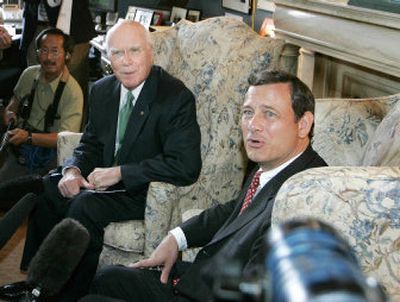Roberts faces test at hearing

WASHINGTON – When the first U.S. Supreme Court confirmation hearing in more than a decade begins Tuesday, John G. Roberts will confront some of the sharpest, most experienced and aggressive inquisitors in the Senate.
Democrats, prodded by liberal constituencies, and Republicans, eager to defend the president’s selection, have been girding for at least a weeklong confrontation over an unquestionably conservative nominee.
Democrats want to draw the line at what’s acceptable conservatism and what’s not. Facing another court vacancy with the death of Chief Justice William H. Rehnquist Saturday, they also want to set a precedent for future confirmations that requires nominees to answer questions thoroughly.
Few expect a repeat of the Clarence Thomas or Robert Bork hearings, two of the most contentious confirmation proceedings of the past four presidencies. But constitutional duty, a polarized political climate and personal political ambitions suggest that this hearing before the Senate’s Judiciary Committee will be probing and even combative.
Roberts’ confirmation proceedings – from hearings to floor vote – were supposed to consume Washington this month. But Hurricane Katrina and the government’s response to its devastation will be the dominant issues now when Congress returns from its August recess.
Although Roberts’ confirmation at this point seems assured, much could still happen. Not many thought that judicial conservatives such as Bork, nominated by President Reagan, and Thomas, nominated by the elder President Bush, would become political flash points before their hearings began, either. With Roberts, who was nominated to replace retiring Justice Sandra Day O’Connor, most Democrats have been careful not to signal an outcome until the hearings end.
“You have to wait and see how Judge Roberts answers questions,” said Sen. Charles Schumer, D-N.Y., a Judiciary Committee member. “He has to tell us who he is, judicially speaking. Americans overwhelmingly want to know his views.”
So far Roberts has shown himself to be a disarming nominee, at ease discussing the law, revealing his golf handicap or retelling a Yogi Berra story.
For Democrats, the challenge is to not let him skate through, but at the same time not appear strident or unfair. Sen. John Cornyn, R-Texas, a member of the Judiciary Committee, said he expected Democrats to use the hearings to criticize President Bush. He pointed out that Sen. Patrick Leahy, D-Vt., the committee’s ranking Democrat, has informed Roberts that he intends to seek his views on the administration’s policy on torture.
All eyes will be on Sen. Arlen Specter, R-Pa., the Judiciary Committee’s chairman, whose moderate politics have put him at odds with fellow Republicans in the past. He’s already signaled his intent to question Roberts closely on how much discretion the court should give to congressional action.
Roberts’ toughest questioners are expected to be Leahy, Schumer, Sen. Edward Kennedy, D-Mass., and Sen. Richard Durbin, D-Ill. Kennedy will take the lead on civil rights questions, using memos that Roberts wrote as a young lawyer in the Reagan administration that criticized Kennedy’s legislative efforts on voting rights and anti-discrimination law.
With Republicans holding 55 of the 100 seats in the Senate, the only way Democrats alone could succeed in blocking Roberts’ confirmation would be with a filibuster, extended debate that requires 60 votes to overcome. “If he refuses abjectly to answer everything, it would make a filibuster more likely,” Schumer said.
However, the Senate is operating under a bipartisan agreement signed by seven Democrats and seven Republicans that permits judicial filibusters only in “extraordinary circumstances.” It seems doubtful that all 14 would find that such a circumstance exists with Roberts.
Roberts is well-known in Washington’s establishment. He circulates easily within conservative circles and among the capital’s Roman Catholic power elite. In courtesy calls to senators, he’s struck many as smooth, prepared and charming.
“He is personable. … He wasn’t guarded at all,” said Sen. Ben Nelson, D-Neb. “He, in a very soft way, wanted to assure me that he didn’t seek to be an activist on the bench … that he wasn’t taking an agenda to the court.”